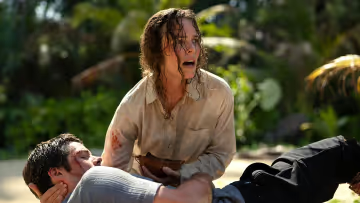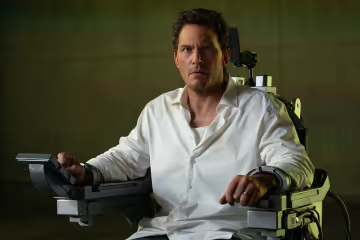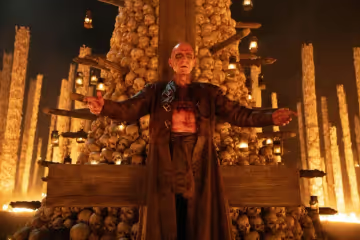In Review: ‘Eddington,’ ‘Cloud,’ ‘I Know What You Did Last Summer’
Ari Aster flashes back to 2020, Kiyoshi Kurosawa returns to online terrors, and a slasher franchise attempts to recapture the spirit of '97.

Eddington
Dir. Ari Aster
149 min.
As Eddington opens, Joe Cross (Joaquin Phoenix) seems like a reasonable-enough fellow. The sheriff of the small town of Eddington, New Mexico, he’s a man of few words who casts a dubious gaze at the conspiracy theories his mother-in-law Dawn (Deirdre O’Connell) prints out and leaves around the house for him to read, theories Joe’s wife Louise (Emma Stone) at least seems open to believing. In ordinary times, these sorts of wild ideas probably wouldn’t interfere with his job at all, which seems largely to consist of keeping the town drunk in line and keeping an eye out for rowdy teens. But these aren’t ordinary times. It’s May 2020 and things are about to get weird in a hurry.
Joe, it soon becomes apparent, isn’t a man with the qualities needed to meet the moment in which he finds himself. Unless, that is, he’s exactly the man for such times, awful as they are. After defending a shopper against the local supermarket’s mask requirement, Joe develops an inflated sense of what he has to offer Eddington, and the rest of the world. It just takes a small leap for Joe to decide he should run for mayor himself. Besides, someone has to stand up to mayor Ted Garcia (Pedro Pascal), if only because the two share an uncomfortable history that still bugs Joe, no matter how reasonable Ted seems, or how much money might flow into Eddington thanks to Ted’s plans to bring a computer processing center to the area. Right is right and wrong is wrong and how can anyone be on the side of freedom if they’re forcing others to wear masks?
Ari Aster’s follow-up to Beau is Afraid doesn’t exist in quite the same surreal space. In fact, until a long, violent (and puzzling and unsatisfying) final act, the world of Eddington seems to exist just a little north of the reality of the 2020 we lived through (and then only part of the time). The murder of George Floyd opens another front in the culture war, one that finds some of the town’s teens attempting to denounce their whiteness and taking to the streets by the, well, dozens. Eddington, New Mexico is too small to be a microcosm of America, but that doesn’t mean what happens in the wider world doesn’t create small-town reflections.
In fact, the border between the wider world and Eddington gets pretty blurry. Aster’s film is smart in the ways it depicts how the internet has distorted the way we view what’s around us. Beyond the clippings Dawn shares, Joe is surrounded by conspiracy theories that, as his candidacy advances, he becomes all too happy to repeat. (Does he truly believe them or just want to use them to his advantage? Does it matter?) An otherwise sensible-seeming deputy has started to see everything in terms of how it relates to the cryptocurrency market. A distance has crept into Joe and Louise’s marriage—if it wasn’t already there—which might help explain why she’s open to the ideas of Vernon Jefferson Peak (Austin Butler), a self-styled guru and obvious grifter who sees the coming of Covid-19 as once-in-a-lifetime opportunity to pick up new followers.
Often queasily dead-on in capturing the madness of 2020, Eddington benefits from Aster’s technical precision and commitment to dark humor (no matter how touchy the subject), and Phoenix’s intense, cryptic performance. But for as effective as Eddington is at establishing the misinformation, moral confusion, and free-floating paranoia of 2020 (which now looks like an unfortunate tone-setter for the decade that would follow), the film struggles in figuring out what to do with the terrible world it summons up so well. At its best, the film feels like a contemporary Western spin on Nashville (complete with a ramshackle vehicle sending out political messages via a loudspeaker) but everything that follows a shocking late-film turn plays less like an attempt to depict confusion than an act of surrendering to it. In the end, Eddington feels like a long, skillfully crafted, provocative cinematic shrug emoji. —Keith Phipps
Eddington arrives in theaters tonight.


Cloud
Dir. Kiyoshi Kurosawa
125 min.
Once upon a time, Kiyoshi Kurosawa directed two of the scariest and brainiest films to come out of the J-horror boom of the late ‘90s and early ‘00s: 1997’s Cure, a bone-chilling psychological thriller about a series of killings that spread like a mysterious contagion, and 2001’s Pulse, a techno-shocker about literal ghosts in the machine. His work since has only occasionally dipped into horror, but even when his name was associated with directors like Takashi Miike (Audition) and Hideo Nakada (Ringu), Kurosawa seemed more interested in using the genre to evoke social ills than goose the audience with uncanny effects. (Though he proved awfully good at that, too.) For as frightening as they are, Cure and Pulse are also about social phenomena, with the former nodding to Aum Shinrikyo’s sarin-gas attack on Tokyo’s subway system in 1995 and the latter expressing unease about the rise of the internet.
The Kurosawa of Cure and Pulse is back, albeit to a strange and slightly diminished degree, in his new film Cloud, which returns again to worries about modern, tech-driven life and doesn’t engage fully with any one genre. It could be called horror-adjacent at times. Towards the end, it’s more like an abstract, deconstructed action film. There are stretches of it that feel nonsensical and other moments that are completely inspired and singular, though the sum of Kurosawa’s wild ride adds up to much more than its misshapen parts. It would not be out of line to dismiss Cloud as merely incoherent, but Kurosawa is more interested in sustaining a destabilizing tone and the existential payoff for that hits hard in the final minutes.
Until then, the film follows an inscrutable Masaki Suda as Yoshii, a low-wage textile factory worker by day who moonlights as an online reseller, a side business that he’s spent two years trying to make viable long-term. Yoshii hits the jackpot when he lowballs a pair of desperate sellers on a large supply of medical devices and sells them for many times their worth at an online retail site. With that money in hand, Yoshii and his girlfriend (Kotone Furukawa) move from his cramped one-bedroom in Tokyo to a spacious, lakeside rental home in the suburbs, which he quickly converts into a storage and sales floor. He even hires a devoted young local (Daiken Okudaira) to handle the shipping of merchandise that an increasing number of angry customers are discovering is fake. They want revenge.
Kurosawa never makes much sense of Yoshii’s business model, but then again, he doesn’t seem to have an angle on Yoshii himself, who’s either a scam artist who deserves what’s coming to him or a misunderstood entrepreneur who’s victimized by an online mob. Pressing shirts in a machine all day isn’t putting on the management fast track, so Kurosawa gives him a 21st century vocation that suits his ambition and material wants, but which lands him in a world of exploitation and fury. The online mob that chases him is a motley collection of malcontents, leading to a climactic melée that’s violent, haphazard, and hard to shake. The road to hell is a stupefying one. —Scott Tobias
Cloud opens in select theaters tonight.


I Know What You Did Last Summer
Dir. Jennifer Kaytin Robinson
111 min.
Maybe there are solid marketing reasons behind it or maybe it’s just an attempt to introduce more chaos into the universe but, either way, simply reusing the name of the first film in a series as the title of the latest entry is one of the most baffling recent trends in naming movies. Neither 2018’s Halloween, 2022’s Scream, nor the new I Know What You Did Last Summer (2025) are remakes of their respective originals. They're sequels. Or, to use a term coined by friend of The Reveal Matt Singer, they’re legacyquels, films in which old cast members appear side-by-side with their next-gen successors to keep the franchise wheels turning. Then again, maybe it’s just truth in advertising, an acknowledgment that if you go see a new movie called I Know What You Did Last Summer in 2025, you know you’re buying a ticket for a film that’s not going to break radically with the past, whatever it is. Maybe every entry should have the same name, like new issues of a magazine. Would anyone notice?
I Know What You Did Last Summer (2025) takes place within the same universe as I Know What You Did Last Summer (1997). But it also takes place in the same post-Scream slasher milieu in which even the characters seem to realize they’re stuck in a genre film that has to follow certain rules even when they don’t say it out loud. That’s made clear pretty early on, when Ava (Chase Sui Wonders), who’s returned to her childhood home of Southport, South Carolina for her best friend Danica’s (Madelyn Cline) wedding, piles into a car with Danica and a handful of other partygoers/victims-to-be for a winding drive along a poorly lit cliffside highway.
Those familiar with the original film will feel the deja vu kicking in even before one of the passengers screams in a panic as if they’re about to hit someone, as in the original movie. Except it’s a fake-out, a dumb joke playing off viewers’ expectations. Then, in an instance of history truly repeating itself, their shenanigans send a car careening off the road, putting them in a difficult position in which they have to cover up their role in the accident or suffer the consequences, just like the characters in the 1997 installment.
Ultimately any irony turns out to be dashes of seasoning on top of a rehash in Do Revenge director Jennifer Kaytin Robinson’s attempt to revive the series (which previously inspired two sequels and a streaming series). Like its namesake, I Know What You Did Last Summer is a thoroughly watchable, instantly forgettable slasher film built around a whodunnit plot that doesn’t really make a lot of sense. One year after the unfortunate accident, Ava returns for another Danica-centric celebration, this time celebrating her engagement to a new fiancée. Those involved with the accident have done their best to forget the events of that night, only someone hasn’t forgotten. Among her gifts, Danica receives a note reading, yes, “I know what you did last summer.”
One-by-one, Ava and Danica start to lose their friends, prompting them to seek help from the two survivors of the events of the 1997 murders: Julie (Jennifer Love Hewitt), now the sort of cool college professor who lectures wearing a Cure t-shirt beneath a blazer, and Ray (Freddie Prinze Jr.), who now owns a local bar. That Ray and Julie end up playing key roles in the plot proves to be one of the film’s cleverer touches (relatively speaking), alongside the appearance of a true crime podcaster named Riley (Gabbriette Bechtel) obsessed with Southport’s history, but neither adds up to much. As a brand, I Know What You Did Last Summer ultimately just means a slasher film with a killer who favors nautical gear and the weapons that go with it, like a hook and a harpoon gun. But one scene does involve confining a character in a lobster trap. At last, a new idea. —Keith Phipps
I Know What You Did Last Summer careens into theaters tonight.





Discussion